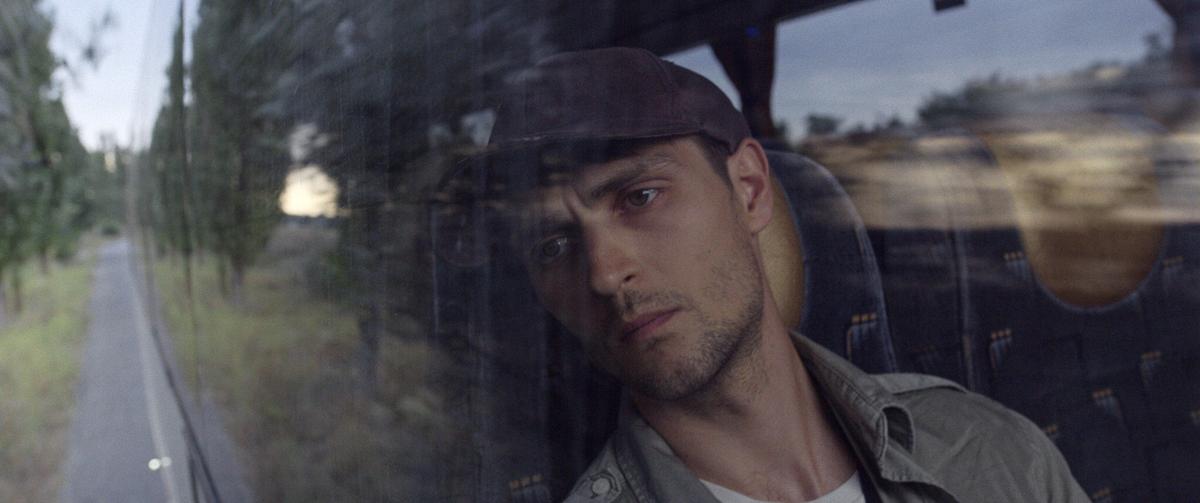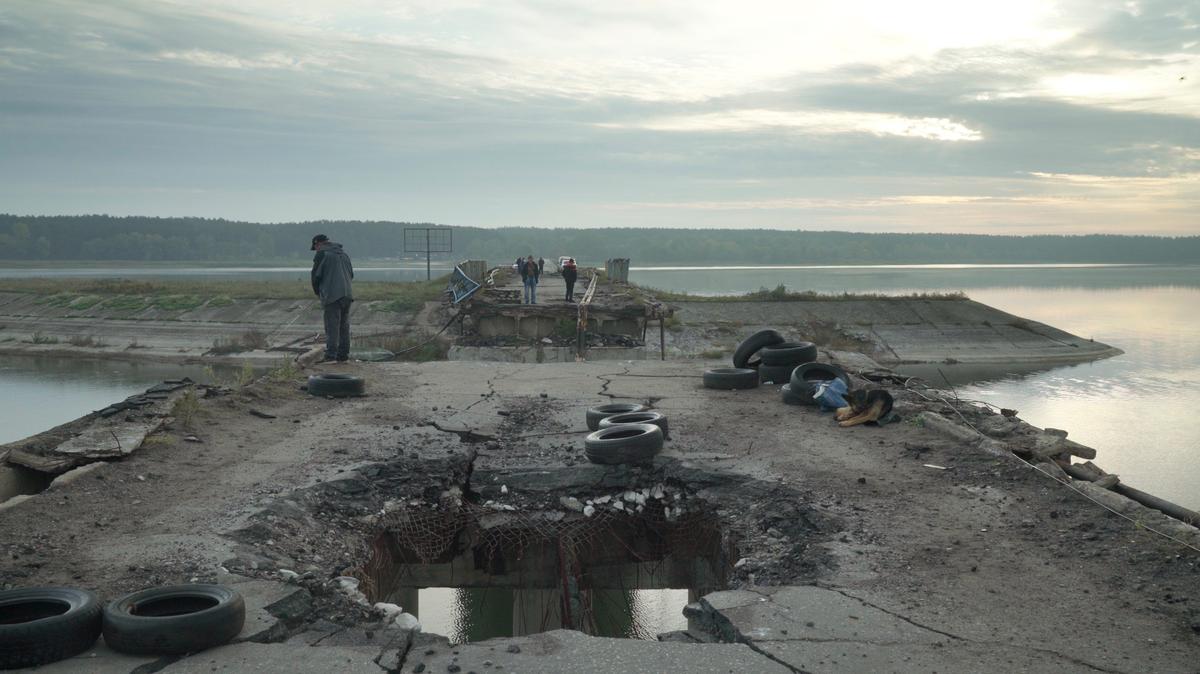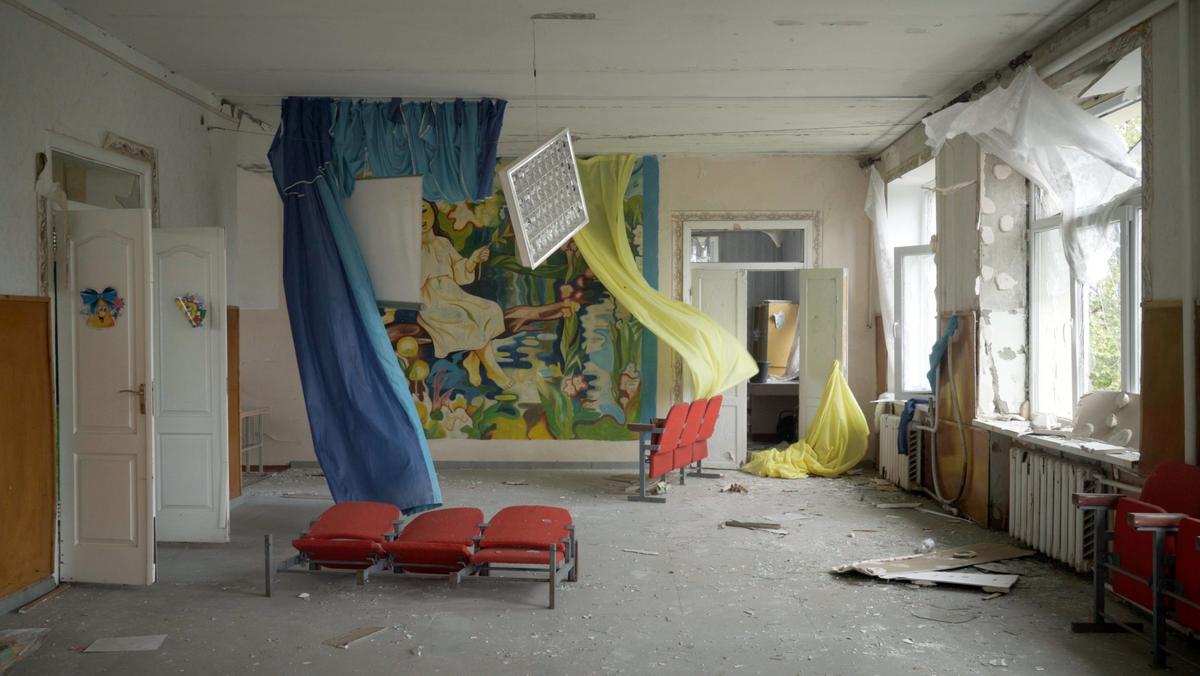A Bit of a Stranger, Svitlana Lishchynska
The Editorial Office, Roman Bondarchuk
Intercepted, Oksana Karpovych
Three Ukrainian films that had their world premiere at last week’s Berlinale examined the war through three very different lenses: one looking the violence directly in the eye, another taking satirical stock of eastern Ukrainian society, and a third, far more personal film, documenting the war’s effect on four generations of women in a single family.
While work on Svitlana Lishchynska’s documentary about her own relatives A Bit of a Stranger began in late 2021, the threat of war hangs over it from the start, not least as their home town Mariupol is now synonymous with Russia’s brutal three-month siege.
Intercutting grainy video footage from her own youth in the 1990s with the contemporary interactions of her mother, daughter and baby grand-daughter, Lishchynska cuts to the heart of the tension within the multigenerational family: having given birth to her daughter, the ambitious, young Svitlana went off to Kyiv to follow her dream of becoming a director, leaving her daughter Sasha to be brought up by her grandmother.
Sasha, now a hairdresser in her early 30s, openly admits she still resents her mother for her choice, her ambition, and, in particular, for not wanting to build her life around having a child. Svitlana, for her part, regrets that they are still somewhat estranged to this day, but remains defiantly unapologetic about her life choices.

A still from A Bit of a Stranger. Photo: Albatros Film
Another more external tension grips the family too: their relationship to their homeland and its language. Despite being Ukrainian, the family is thoroughly Russified to the point that only Svitlana speaks Ukrainian at all, having made a conscious and political choice to do so later in life.
The often tense conversations between the women are deeply moving, brought about by a sense that they may not have much time left together as they become refugees, fleeing Mariupol for Kyiv before the siege, and then on to Europe. Each is affected by the war in different ways, and they take advantage of the time on their hands to reassess their lives and to address the various sources of tension between them that have developed over the years.
Grandmother Valentina, who professes to love even Mariupol’s “dirty pipes”, becomes increasingly indifferent to material things, telling her daughter she doesn’t feel the need to take anything from her home as she flees, remarking that “everything has to burn so we can live in the future, not the past”.
Svitlana herself looks inward and backward, attempting to address the fact that she feels she grew up without love and has never therefore been able to give it to others herself. In turn, Sasha, by now a refugee in London, has an existential crisis, and frequently breaks down crying inconsolably, with the alienation she feels in her new home especially well reflected as she wanders through the crowds gathered for the coronation.
The documentary is perhaps at its most enlightening when the protagonists discuss their mixed feelings towards Russia, never having to draw a line between language and nationality before, something English speakers have done for centuries. But it’s as a testimony to family bonds, however strained, and the love that outpaces decades of resentment, that A Bit of a Stranger excels.
Roman Bondarchuk’s highly anticipated second feature The Editorial Office begins as a light-hearted comedy of manners with feckless biologist Yura searching for endangered groundhogs on the Kherson steppe, but the film’s considerable darkness doesn’t take long to materialise as he discovers that forest fires are being set by corrupt business people, after which his companion on the trip goes missing, and he attempts to seek justice by getting two local newspapers to publish his photographs.
The storyline becomes ever more surreal as Yura begins to witness the rot at the heart of local politics, which revolves around the re-election of a mayor who has been in a coma for an unspecified period of time, and whose duties have been taken over by a cabal of local gangsters, while an American con-artist is scamming the local population, including Yura’s own mother, with seeming impunity.
Yura ends up taking a job at one of the local newspapers, which, it transpires, is cosy with the cabal, and where he constantly comes up against its corrupt editor, to whom he naively suggests printing real news rather than fabricated tabloid fare designed to entertain and distract readers from Kherson’s real problems.
As an illustration of Bondarchuk’s range, The Editorial Office is striking as it cycles deftly between black comedy, violent action, family melodrama and political satire until its apocalyptic left turn in the film’s last quarter and its deeply strange yet surprisingly optimistic postscript about Ukraine’s future.

Dmytro Bahnenko as Yura in The Editorial Office. Photo: Moon Man
No such optimism can be found in Oksana Karpovych’s extraordinary post-invasion documentary Intercepted, however. A montage of haunting images of the destruction left by the Russian military in eastern Ukraine — kitchens with food still on the table, empty classrooms, burnt out houses, collapsed bridges and abandoned villages — Karpovych’s sinister cinematography portrays a post-human landscape left to its own fate.
Over this meditative succession of exquisitely composed shots, the titular intercepts of Russian conscripts calling their families at home made by Ukrainian intelligence during the first year of the war are played, their disembodied, anonymous voices like those of ghosts narrating the carnage and brutality of the invasion.
Despite their initial ordinariness and unremarkable tone, the conversations contain multiple and relentless descriptions of war crimes, the shocking nature of which is only amplified by their matter-of-fact delivery.
One soldier describes how civilian passersby are routinely shot to ensure Russian positions aren’t given away, while another gives detailed accounts of torture scenarios and admits to “getting off” on the violent sadism in which he is free to indulge.
Even more shocking is the blithe acceptance of the family members to whom these horrors are being recounted, who do little more than parrot propagandist narratives by way of response.

A still from Intercepted. Photo: filmscosmos.com
While seeing everything, the film’s unrelenting eye is nevertheless one devoid of judgement, and Karpovych allows the Russian soldiers to incriminate themselves. No other voices are heard. The toxic effect of relentless state propaganda is made abundantly clear by the fact that as the months pass, it is the soldiers, increasingly traumatised and disillusioned by the horrors they are witnessing, who begin to sound like the more reasonable party, while those at home increasingly dehumanise Ukrainians and praise every act of violence visited upon the local population.
In one moment of supreme cognitive dissonance, one woman tells her caller that he is not killing civilian children but fascists, despite the fact that he has just confessed to her that he’s been killing civilian children. “Are you sure these are even people?” another voice in a subsequent conversation asks.
Karpovych’s harrowing documentary is a bleak triumph and one of the best imaginable illustrations of the banality of evil — a parallel fascist reality in which only the vocabulary of war, resentment, violence and revenge carry any real meaning.
Join us in rebuilding Novaya Gazeta Europe
The Russian government has banned independent media. We were forced to leave our country in order to keep doing our job, telling our readers about what is going on Russia, Ukraine and Europe.
We will continue fighting against warfare and dictatorship. We believe that freedom of speech is the most efficient antidote against tyranny. Support us financially to help us fight for peace and freedom.
By clicking the Support button, you agree to the processing of your personal data.
To cancel a regular donation, please write to [email protected]

